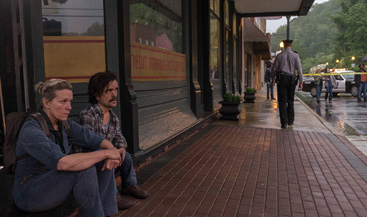The 400-Word Review: Three Billboards Outside Ebbing, Missouri
By Sean Collier
December 5, 2017
BoxOfficeProphets.com

Martin McDonagh, the acclaimed playwright turned film director and screenwriter, has an almost Shakespearean knack for creating stories that unwind with simultaneous inevitability and surprise — tales which seem perfectly crafted and move like clockwork, yet are never anything less than shocking and stunning.
Three Billboards Outside Ebbing Missouri, McDonagh’s third film, does just that. And its moments of uproarious, gut-busting laughter are rivaled in power and impact by its moments of shock, despair and hopelessness. This is a pitch-perfect dark comedy — and a cinematic knockout punch.
Mildred Hayes (Frances McDormand) is a bit fed up with her local police force; it’s been seven months since her daughter was killed, and the bumbling cops don’t seem to be working on finding the culprit. When she erects a series of complaints on billboards near her home, Sheriff Bill Willoughby (Woody Harrelson) is perturbed if slightly amused; his rage-filled sidekick, Officer Jason Dixon (Sam Rockwell), is infuriated. Half the town is incensed at the brashness of Mildred’s statement; the other half is happy about it.
The twists that come from there are too good to reveal here, but the gradual crossfade from wry rampage to despairing resolution is a sight to behold.
As are the performances, particularly that of McDormand. (Harrelson and Rockwell are quite good as well, as are Peter Dinklage and Caleb Landry Jones.) You’d think that after a career as storied as McDormand’s, she would no longer possess the ability to surprise; Three Billboards is the counterargument to that assumption. This is her finest performance. I’m stuck on a pair of Mildred’s monologues — one a feat of comedic timing, one a marvel of restrained emotion. It’s a sublime turn.
Until Three Billboards, McDonagh’s best work was to be found on the stage. In Bruges and Seven Psychopaths were fine films, but not up to the caliber of The Pillowman or A Skull in Connemara. With this film, that changes; McDonagh has mastered film as he mastered the theater and created one of his best works. And, certainly, one of the year’s best films.
My Rating: 10/10
Sean Collier is the Associate Editor of Pittsburgh Magazine and a member of the Broadcast Film Critics Association. Read more from Sean at pittsburghmagazine.com/afterdark